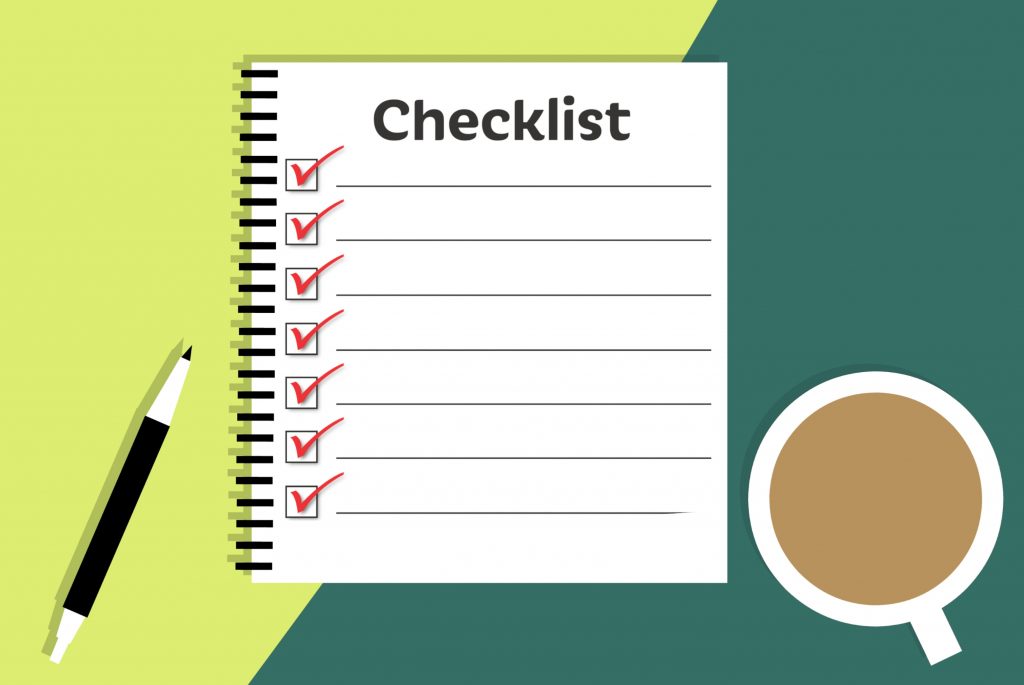Your Summer Checklist

A checklist helps to ensure no gaps in your health care, financial, insurance, or estate plan documents.
Power of Attorney Checklist
- Are your agents outdated because of age, disability, or residence?
- Is a minor now old enough to be your agent?
- Update your Health Care Power of Attorney to include authority for your agent to access healthcare workers remotely and to visit you via Zoom or Facetime.
Health Care
Whether a trip to the hospital is sudden or planned, you will need a current Health Care Power of Attorney document. You will be asked for this legal document, and if you do not have one, you must sign something you do not understand while in the hospital, under stress, and with plenty of other things on your mind.
A Health Care POA appoints a person to make all health care decisions if you cannot. This person can access your medical records to accept or withdraw treatment, admit or discharge you from the hospital, and make life-support decisions. If you have arrived at the hospital unconscious, it is chaos with your family and medical personnel. This isn’t a situation you want to be in or one you want for your family.
Take a minute to review your existing Health Care POA and ensure your agent is correct and that the document is current. If you do not have one, now is the time to get one.
Financial
The law holds that no one, not even a spouse, can legally sign your name unless you have a valid Financial Power of Attorney designating an agent.
Your Financial POA agent has the legal authority to manage your financial affairs if you can no longer make these decisions yourself. A Financial POA is an important document to ensure that your financial matters are handled efficiently in an unfortunate occurrence.
Now is the time to review or obtain a Financial Power of Attorney document.
Beneficiary Designations Checklist
- Were any children born after you opened your insurance policies or tax-deferred accounts?
- Have any beneficiaries died?
- Has your marriage ended, or are you separated from your spouse?
- Do any beneficiaries have a legal disability? Name your Living Trust to avoid government reimbursement from your estate.
- Are any beneficiaries minors under the age of 18? Name your Living Trust to avoid Probate.
Living Trust or other Estate Plan Checklist
- What has changed in your family? Have you moved?
- Does your estate plan reflect your current wishes if something happens to you?
- Are your beneficiaries the same? Do you need to remove a beneficiary or add a new one?
- Are any changes needed when transferring your assets to your beneficiaries?
- Do your beneficiaries require asset protection because of disability, legal trouble, or a failing marriage?
- Is your Trustee or Executor still appropriate?
- Are all your assets titled in the name of your Living Trusts?
Real Estate Deeds Checklist
- Did you remember to retitle your property deed into the name of your Living Trust after the refinance closing?
- Have you moved your residence? Did you take the title of your new property in the name of your Living Trust?
- Are you still working? If so, as the active police and married, the title to the deed of your principal residence should be in Tenants by Entirety for maximum asset protection.
- Have you gotten married?
Living Trusts, if Not Now, When?
We all know that we need an estate plan, and we should take care of it sooner rather than later. However, almost everyone procrastinates when it comes to this essential task.
At the end of your life or incapacitation, they risk Probate if you have property, investments, or bank accounts in your name.
Advantages of a Living Trust
- A Will is Probate. The rule is no one can legally sign your name. Therefore, all assets in your name are subject to the Probate process, which averages 18 months and is costly.
- A Living Trust completely avoids Probate.
- Your financial accounts, life insurance policies, and deferred compensation accounts can name your Living Trust as the beneficiary. This is subject to essential tax considerations.
- A Living Trust estate plan includes Health Care and Financial Power of Attorney documents. It also consists of a Last Will and Testament. A Will is necessary for the guardianship of minor children. It also transfers assets in your name out of Probate.
- A Living Trust contains a No Contest provision and beneficiary Asset Protection clauses.

Comprehensive Benefits of America
For an expanded presentation of asset protection and financial wellness strategies and regular updates on strategies to protect what you have earned, visit and register with CBA using the link below. Registration is free.
Tom Tuohy is the founder Tuohy Law Offices.
312-559-8444
17W220 22nd Street
Oakbrook Terrace, Illinois, 60181
The information being provided is strictly as a courtesy. When you link to any of these websites, Comprehensive Benefits of America, LLC/does not represent the completeness or accuracy of information provided. CBA does not provide professional financial, investment, tax, or legal advice. You should seek certified financial planners, CPAs, and attorneys for advice about your personal needs. See complete Disclosures and the CBA Security and Privacy policies.
POD and TOD Account Disadvantages

POD and TOD Accounts
What are POD and TODs? They are an increasingly popular method of providing for the distribution of financial accounts at your death. They are helpful in certain situations; however, there are critical limitations and risks associated with using them.
Payable of Death (POD)
A Payable on Death (POD) designation is commonly available at banks and used for checking and savings accounts and CDs. Other financial institutions usually use a Transfer on Death (TOD) designation. A POD and TOD are used to name a beneficiary for which the account balance transfers on death.
- Advantages
- Useful for transfer on death in smaller estates of less than $100,000 in total assets with no particular circumstances. (see below)
- Appropriate for many checking accounts, particularly those held at Chase Bank, to avoid inconveniences.
- It avoids Probate but comes with risks.
- Disadvantages
- Disinheriting: Regardless of the size of your estate, you might unintentionally disinherit a child or other intended beneficiary. Or the beneficiary might not share the funds with your other children as you had hoped. The account ownership automatically transfers to the only person(s) named on TOD or POD. These funds now become part of the named beneficiaries’ family estate if that person dies simultaneously with you or shortly after your death.
- Creditors: Since the funds are owned by your beneficiary immediately, they are also subject to any creditor claims, lawsuits, or divorce filed against the beneficiary.
- Minors: Like with life insurance policies, deferred compensation accounts, and IRAs or other beneficiary designations. If the beneficiary is under 18 at your death, the proceeds or funds go to Probate.
- Disability: If your beneficiary has a disability now or acquired one from an accident or illness before your death, In that case, the POD and TOD funds could end up with the government or jeopardize their Medicaid and SSI.
- Predeceased Beneficiary: The funds are subject to Probate if your beneficiary dies with you or before your death. There are no alternate beneficiaries on TOD/POD accounts.
- Squandering Inheritance: Statistics show that most inheritance is spent within 18 to 36 months. I am confident the shorter the time, the younger the beneficiary.
POD vs. Living Trusts
I write about Living Trusts frequently because they are much more than an estate plan. Living Trusts organize your assets now and safeguard them after your death. They also can avoid all of the above disadvantages of POD/TOD designations.
Living Trusts also protect your assets from Guardianship Court if you acquire a disability. Additionally, if you are contemplating a second marriage, a Living Trust is essential to segregate your assets from future marital funds for prenuptial protection.
Living Trusts, if Not Now, When?
We all know that we need an estate plan, and we should take care of it sooner rather than later. However, almost everyone procrastinates when it comes to this essential task.
At the end of your life or incapacitation, they risk Probate if you have property, investments, or bank accounts in your name.
Advantages of a Living Trust
- A Will is Probate. The rule is no one can legally sign your name. Therefore, all assets in your name are subject to the Probate process, which averages 18 months and is costly.
- A Living Trust completely avoids Probate.
- Your financial accounts, life insurance policies, and deferred compensation accounts can name your Living Trust as the beneficiary. This is subject to essential tax considerations.
- A Living Trust estate plan includes Health Care and Financial Power of Attorney documents. It also consists of a Last Will and Testament. A Will is necessary for the guardianship of minor children. It also transfers assets in your name out of Probate.
- A Living Trust contains a No Contest provision and beneficiary Asset Protection clauses.
Comprehensive Benefits of America
For an expanded presentation of asset protection and financial wellness strategies and to receive regular updates on strategies to protect what you have earned, visit and register with CBAPlan on the link below. Registration is free.
Tom Tuohy is the founder Tuohy Law Offices.
312-559-8444
17W220 22nd Street
Oakbrook Terrace, Illinois, 60181
The information being provided is strictly as a courtesy. When you link to any of these websites provided herein, Comprehensive Benefits of America, LLC/ makes no representation of the completeness or accuracy of information provided at these sites. CBA does not provide professional financial, investment, tax, or legal advice. You should seek certified financial planners, CPAs, and attorneys for advice relative to your personal needs. See complete Disclosures and the CBA Security and Privacy policies.
George Halas, Prince, and a Chicago Cop

What could those three people possibly have in common?
Horrendous estate planning.
Not Having an Estate Plan
Prince
Let's dispense with Prince first and then find out why George Halas and a Chicago police officer have unofficially ranked #1 and # 2 as the two worst estates the decades-long Chief Judge of Cook County Probate ever heard.
The musician Prince died on April 21, 2016. He had no estate plan. Six years later, his estate, valued at hundreds of millions of dollars, is still in the predictable mess of the Probate Court system. Because Prince left no estate plan, the state is left to determine how much his estate is worth and who will receive it.
Having a Plan but not a Good Plan
If it sounds unimaginable that someone with assets, royalties, and a legacy eventually worth billions didn't plan for the inevitable day he wouldn't be here, the list of well-known people who did the same can fill a book. The court ordered Jackie Onnasis's personal property sold to pay otherwise avoidable estate taxes. James Gandolfini, "Tony Soprano," had a Will but not a Marital Trust, and because of that mistake, his estate paid the IRS $30 million, and his 13-year-old son ended up in the center of, you guessed it, a Probate battle.
Aretha Franklin, Elvis, Tony Hsieh, founder of Zappos (that estate may never settle), Kobe Bryant; the list goes on.
George Halas
On October 31, 1983, George Halas died without a Living Trust or a workable succession plan for the Chicago Bears. He wanted his son, Mugsy Halas, to take over the Bears, but Mugsy died suddenly in 1979, and George never created an alternate plan. For over a dozen years, the children of Mugsy and the children of his daughter Virginia McCaskey battled in Cook County Probate Court to the extent that ownership shares of the Bears had to be sold to pay for the legal fees. The Halas kids weren't even invited to the Super Bowl. Today, many fans wish the McCaskeys had sold all their shares.
Most importantly, this mess is not what George Halas wanted for his family and the Chicago Bears.
The Chicago Cop
A Chicago Police Officer died, leaving a Will as his estate plan to provide for his seven children. His kids fought each other in Probate Court for 18 years until there was nothing left in their father's estate. One day, I stood before the chief judge, who told me he hated this case as much as he did George Halas's case.
Whether it was the grandchildren of George Halas and the future of the Chicago Bears or the children of a Chicago Police Officer and a family's entire savings and legacy, none of it should have happened, and all of it should have been avoided.
Having a Will or no Will as an Estate Plan = Probate
If there's a Will, there are relatives. And if there isn't a Will, there are even more relatives.
A Will is merely your wishes that a Probate Court follows to distribute your assets. A Last Will and Testament must be probated. This rule comes from the law that no one can legally sign your name. Therefore, if you die with assets in your name, a Probate Court judge must appoint an Executor to sign your name for the asset transfers to your named beneficiaries. The court determines who receives your assets if you do not have a will.
The system cannot handle everyone's estate. Therefore, it can take years to get through the process. And that is if no one contests, which is very easy. It doesn't matter if you are a celebrity; probate is not the way to go.
The police officer's kids fought with each other because they could. Every example I gave above was easily avoidable.
Living Trust Estate Plan Avoids Probate
I have spent more time in Probate Court than I ever want to remember. So, I dedicated my career to helping people avoid the system and keep their affairs private and their families at peace with each other, and I am grateful for you and your memory. No matter who you are that is a legacy you deserve.
The first hurdle of planning is just getting it done. Estate planning is not high on anyone's list. But we all know how uncertain life is, and none of us are getting out of this thing alive. And none of us know when we will go.
To avoid massive headaches and expenses for your family and give yourself peace of mind, you need a Living Trust estate plan.
How Does a Living Trust Work?
Your real estate titles (in all states) transfer from your name to your Trust name. Life insurance policies and deferred compensation accounts can name your Living Trust as beneficiary, subject to essential tax considerations.
A Living Trust estate plan includes Health Care and Financial Power of Attorney documents. It also consists of a Last Will and Testament. A Will is necessary for the guardianship of minor children. It also transfers assets in your name out of Probate.
Finally, a Living Trust contains a No Contest provision and beneficiary asset protection clauses.
Comprehensive Benefits of America
For an expanded presentation of asset protection and financial wellness strategies and to receive regular updates on strategies to protect what you have earned, visit and register with CBAPlan at the link below. Registration is free.
Tom Tuohy is the founder Tuohy Law Offices.
312-559-8444
17W220 22nd Street
Oakbrook Terrace, Illinois, 60181
The information being provided is strictly as a courtesy. When you link to any of these websites provided herein, Comprehensive Benefits of America, LLC/does not represent the completeness or accuracy of the information provided at these sites. CBA does not provide professional financial, investment, tax, or legal advice. You should seek certified financial planners, CPAs, and attorneys for advice about your personal needs. See complete Disclosures and the CBA Security and Privacy policies.

17W220 22nd St.
Suite 300
Oakbrook Terrace, IL 60181
admin@cbaplan.com
